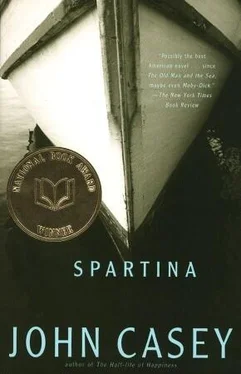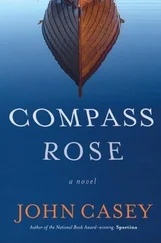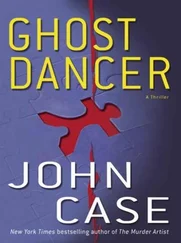He got up. She caught his arm. He said, “I got to put our fish away. You did good. Parker and me ought to cut you in.”
When he finished with the fish, Dick was embarrassed. What in hell did he think he was up to?
Parker had brought out a bottle of bourbon. Schuyler had been looking for sharks where the entrails had drifted off, but they’d disappeared.
Elsie took a swig from Parker’s bottle. Dick took a swig and got a beer for a chaser. He looked up. The plane was gone. The sun was showing orange along the bottom edge.
Dick tried to calculate the profit. The crabs would cover the fuel, and maybe the new line. Seven hundred for Elsie’s fish, maybe five hundred and some for the others. Twelve hundred. His split, maybe four hundred. And marlin steaks twice a week for the family for six weeks.
It beat inshore lobstering and tonging. And he might have guessed light on the swordfish, maybe another thirty, forty bucks for his share. And Parker owed him a hundred for the stuffing box.
He took another swallow of beer. Parker swung the boat toward the sun, homeward bound. Dick felt good. He saw that, as he was getting closer to his boat, there seemed to be more ifs and maybes, more cross-currents. He saw all that, but he was up for it. He’d fought clear of how bad things had been. He was pulling toward his boat in August. He felt strong, and he felt lucky.
Dick took the wheel after supper. The other three sacked out. He throttled back to save fuel, rode easy across the long waves. By the time he saw land, the sun was down, the Matunuck Hills black against the sky. The water glistened jet and violet as he picked up the lights on the breakwater.

D ick slept twelve hours. At noon he picked up the engine in Providence. Got it onto its bed by suppertime. The next morning he borrowed Eddie Wormsley’s flatbed and picked up another load of lumber. Worked from mid-morning till sunset. Eddie Wormsley and Charlie helped during the afternoon.
He put in another full day, and then it was time to see Parker about going out again.
If they had good runs every week, he’d have the boat finished by Labor Day. He’d have put in another ten thousand dollars. After that he needed another six or seven thousand for some more fittings, paint, RDF, loran. He decided to wait a bit before he got Joxer over and made his pitch to him.
Dick took ten bucks and headed for the Neptune.
The Sox were in the second half of a twi-night doubleheader at Fenway. Parker was at the bar.
Dick had a beer with him at the bar and then got him to sit down when a table opened up back in the corner. Dick talked to Parker about his plans for his boat. Parker kept an eye on the game, but said enough so that Dick knew he was listening. During the seventh-inning stretch Parker said, “I may be around for the summer, I may not. If I’m around, we may make a few runs. But don’t count on it to be regular. Right now it looks good — we’ll go out tomorrow night. I’m not going to put out a lot of money for more pots. Maybe you should see if Joxer Goode will make us a deal — lend us some, rent us some. We’ll promise him we’ll go all the way to the edge of the shelf. I’m not so sure about a spotter plane. Six hours at fifty bucks. Maybe you want to split it?”
Dick said he couldn’t.
Parker said, “Maybe you’ll throw in your skiff. You’re right about that dory.”
“Then Charlie couldn’t haul my pots.”
“Forget your pots. Or better yet, bring them out with us.”
“If I lend you the skiff, will that do for my half of the spotter?”
“Lend?” Parker said. “I meant a sale. I’ll spring for two thousand dollars of spotter over the next month, you throw in the skiff.”
Dick said, “Hell no.” He was so mad he couldn’t say any more.
“Get you another beer? Don’t get all huffy, Dick. I been meaning to say something to you. You want that beer?”
Dick said no. Parker got up and went to the bar, brought back two beers anyway.
“Tell me if I’m wrong,” Parker said. “You got laid off Texeira’s boat ’cause you kept letting the mate and the crew know you’re saltier than them. You didn’t do too good in the Coast Guard for more or less the same play. You got fired from the boatyard for some miscues with a couple of owners. And one of your big days last year was when a big yacht pulled up on you in a fog and asked you how to find the harbor. You led his fifty-footer in your diddly-squat skiff with you rowing. Kept him putt-putting behind you, just to make him feel like an asshole. You laughed in his face when he tried to give you a tip.
“There’s more, but that’s the pattern. You spend a lot of time dividing up the world into the idle rich and the true-blue salts. The unworthy and the worthy. And what you do get out of all this? You get to feel pissed off. Am I leaving something out? You get to feel salty as hell, but mainly pissed off. You also get to be poor. Tonging quahogs in your eighteen-foot skiff.”
Dick was mad as hell, but for some reason this anger made him cold and numb. Dick said, “Yeah, my skiff you just tried to cheat me out of.”
Parker laughed. “I make you an offer. Instead of coming back and saying, ‘No, but I’ll take four thousand,’ you get all indignant. You make everything a moral issue.”
Dick said, “You want to make an offer on my kids?”
“There you go again,” Parker said. “At least I got your attention. There are times I divide the world the way you do, the bad guys and good guys. And other times other ways, depending. Sexy, not sexy, tight and loose. But one way, one important way is this — players and nonplayers.
“What gets me is you could be a player. What you end up doing is what nonplayers do. Nonplayers drudge, and then bitch and moan about it, how bad it is, how unfair it is, and they drudge some more to make it even badder and even more unfair.”
Dick said, “You ever hear me bitching and moaning?”
“Sometimes I can just look at you and feel it. Inside you’re sucking on a lemon. You don’t need to say it.” Parker sipped his beer. “I want you to consider Schuyler. You look at him, and you despise him for being too rich and too cute and his house is too big. You’d like to show him he’s not salty, not strong, not half the man you are. I’ll tell you, you could do all that, and he would be amused.
“I look at him and I see some of what you see, but I also see he’s a player. I don’t know where he got his first chunk of dough, but I found out he’s playing. He didn’t pay much cash for the Wedding Cake — it was leveraged. Now he’s in with Joxer Goode, and with Elsie’s rich brother-in-law, and there’s Salviatti too, who’s even richer. When it came time to play, Schuyler threw in the Wedding Cake without blinking. If he’d have blinked, those other three would have known he was a nonplayer and they would’ve bought him out or left him alone. They would have finally offered for the Wedding Cake a lot less than what Schuyler’s buying with it now. He was ready. And another thing is, he acted like any minute he was about to fly high with some other TV-movie deal. He didn’t bitch and moan about how little money he got paid his last time out. He acted like things are moving, he’s moving, and those guys got a sense that he’s a player. When they said they’re each raising a quarter of a million he didn’t say, ‘Jesus! That’s all I’ve got!’ He said, ‘Will that be enough? Will that be enough to do it first-class?’ And that got Elsie’s brother-in-law talking about what kind of a place he had in mind, Schuyler got him on the defensive.”
Читать дальше













